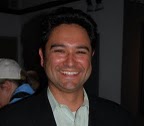Philanthropy411 is currently covering the Communications Network and CommA Fall 2010 Conference in Los Angeles with the help of a blog team, which is part of the conference’s 2nd annual Gorilla Engagement Squad. This is a guest post by Adin Miller, owner of Adin Miller Consulting. Follow him on Twitter: @adincmiller
by: Adin Miller
The Fall 2010 Communications Network / CommA Conference (ComNet010) began this morning with a presentation by James Surowiecki, author of the Balance Sheet column for the New Yorker and the book The Wisdom of Crowds, on finding better answer and solutions through a focused efforts to engage group intelligence. The session was an excellent way to engage the audience – mostly communication personnel in philanthropic institutions – in a in-person and Twitter discussion about the potential power of using crowds to inform decision making and organizational vision. It also raised a lot of questions.
Mr. Surowiecki cited several examples of crowd generated wisdom that included Google’s search engine algorithms, Twitter traffic and trends, NASA’s participatory exploration effort, and even ‘ask the audience’ lifeline on the TV show Who Wants to Be a Millionaire. A particular interesting example involves horse racing, where crowds composed of experts and casual fans create remarkably accurate forecasts and odds for the race results.
However, he prefaced his comments by stating that we need to have the right conditions in order to appropriately tap into collective wisdom. That kind of left us holding out throughout the session for a list that would identify those conditions. The answer, summarized below, came out over several different moments.
The right conditions to develop wise crowds and obtain good information require:
1. The opportunity and ability to aggregate individual opinions;
2. A diversity of opinions borne from difference in cognitive approaches. Mr. Surowiecki stressed this criteria the most. Diversity expands the range of options available for crowds to assess. By embracing diversity of opinions, organizations can become smarter, avoid making mistakes in implementing group intelligence, and reduce the chance of developing echo chambers;
3. A willingness to embrace arguments;
4. Situations that foster independent thought;
5. Structuring questions as open-ended inquiries that elicit granular level answers; and
6. Leaders to check their own egos and let others speak first so that alternative insights can be heard.
As the plenary wrapped up, the more salient questions were raised on Twitter in response to attendees’ posts. My friend Gene Golovchinsky (@HCIR_GeneG), a brilliant man working on issues such as Human-Computer Information Retrieval and Collaborative Exploratory Search, chimed in from afar that Mr. Surowiecki’s criteria “are seldom met by those invoking “wisdom of crowds” rhetoric, particularly on the web.” He expanded on the point by noting that one key assumption of “wisdom of crowds” is independence of opinion; however, if you are part of the crowd as see how others responded already, then there is no independent though process. This lack of independence instead creates “self-reinforcing cascades rather than convergence on mean;” in other words, the crowd is influenced by people’s behavior instead of providing a separate independent points of view that can be aggregated into a true reflection of the wisdom of the crowd.
Lucy Bernholz, president of Blueprint Research & Design and author of the blog Philanthropy 2173, reinforced Gene’s points. Lucy, who will speak to the ComNet010 audience on the second day of the conference, challenged the diversity criteria by noting that “people like talking to those like themselves on the Internet. Diverse crowds are NOT easy on Internet.”
Taking these counter-points into account, the implication for philanthropic institutions means that getting diverse opinions may present some them with significant challenges. Embracing diversity in developing a crowd should involve divergent community and stakeholder perspectives. For a foundation, for instance, that might involve past grantees, applicants not approved for funding, existing grantees, community organizations affected by the foundation’s work, competitors, thought leaders, donors, and even members of the general community (and I’m sure my list is still not long enough). And yet, by embracing diversity, the foundation has to be willing to let the crowd challenge the power structure it represents. That’s not a comfortable space for many funders, I suspect.
The conclusion of the session and the subsequent breakout session on the subject raised additional questions. ComNet010 participants asked:
- What are the implications on future hiring and development of marketing and communication personnel as we look to embrace the wisdom of crowds?
- How can we use crowd intelligence more effectively, especially around public policy and advocacy?
- Group intelligence offers a mandate for divergence and divergent thinking, but how do foundations balance that in an environment driven towards convergence?
- What tools exists to let foundations crowds generate wisdom?
The issue that stood out to me by the end of the morning was the concern that philanthropic institutions would embrace an approach that would generate input from crowds, but then ultimately ignore that wisdom if it did not conform to the opinions of organizational leaders. That again begs the question if philanthropy is ready and willing to set aside power dynamics and control.
So, while Mr. Surowiecki presented a wonderful subject that represents an important area for philanthropic institutions to explore, much still needs to be clarified and addressed before many would feel comfortable in embracing the wisdom of crowds to shape their activities.







